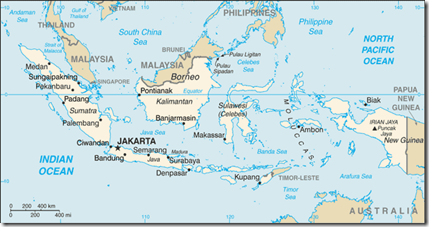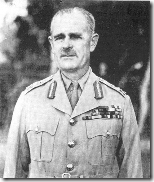The Japanese landed on Java on 1 March, 1942. Singapore had fallen two weeks before, those British troops which had succeeded in getting away in time landing at various points along the coast of Sumatra and at Batavia (the old name for Java).
Eventually all, I believe, arrived in Java.
I may mention that I had, and still have, no information as to the exact course of the events at that time apart from what one could read in the newspapers and observe personally. And as it is already four and a half years since these events occurred I must rely on a very faulty memory to describe the happenings of this particular period which, by its very nature, was one of great confusion. Consequently I will doubtless be guilty of many inaccuracies of detail on various points.
Ena and I were in the Elita Cinema  at the second performance on the night proceeding the fatal day. About half way through the main feature (what the picture was, I cannot recollect) there was some commotion behind us at the door leading to the stalls where we were sitting and, suddenly, a stentorian voice shatters the comparative stillness. "Mannen van de -------, onmiddelijk inrukken!" (Men of the -------, fall in immediately)
at the second performance on the night proceeding the fatal day. About half way through the main feature (what the picture was, I cannot recollect) there was some commotion behind us at the door leading to the stalls where we were sitting and, suddenly, a stentorian voice shatters the comparative stillness. "Mannen van de -------, onmiddelijk inrukken!" (Men of the -------, fall in immediately)
There is a stir and a welling up of excited subdued talk in the hall, but remarkably enough, nobody moves. One gets the impression of a sort of impatient resentment at the interruption. Quite probably it occurs at a tense moment in the film.
The call is repeated and now various figures are seen moving towards the exit, and there is a lot of loud talk in the foyer outside. Somehow everybody seems to be intuitively aware that this is no more precautionary or practice measure, but the real thing at last.
Ever since Holland's declaration of war on Japan immediately after the Pearl Harbour disaster, intensive ARP (Air Raid Precaution) exercises had been the rule and everybody had been kept busy building air raid shelters and reacting at all hours to the day and night to the wail of the very efficient siren systems which had been installed throughout Bandoeng. It is possible that many of the alarms, particularly after the fall of Singapore, were real ones but actually we did not see any Jap planes or hear bombs fall until after the landings on Java. And even in the ensuing week, which terminated in the capitulation, we were not to experience very much in the way of aerial warfare.
During this eventful week, Bandoeng became the scene of almost indescribable confusion and feverish activity. The town was suddenly full of British troops and mechanised equipment. Dutch Government departments and many Dutch and British business houses and banks had also transferred their seats from Batavia to Bandoeng. Almost overnight, it seemed that the comparatively small town of Bandoeng had undergone a metamorphosis and become a fully fledged metropolis.
This, for Bandoeng, unusual activity had actually begun on a small scale  sometime in January, if I recollect aright, with the arrival of General Wavell and his staff, who set up their headquarters at Lembang, a small place some 16 kilometres to the north of the town. Wavell's main task was to organise the British forces in the region so that British territory was protected against a Japanese attack. At this time, we fully expected that Java was to be the centre of resistance to the Japanese advance and were consequently extremely optimistic as to the future. Wavell's silent and sudden departure shortly before the fall of Singapore struck an ominous note, however, and left us with the uneasy feeling that the outlook was not so rosy as we had been leading ourselves to believe.
sometime in January, if I recollect aright, with the arrival of General Wavell and his staff, who set up their headquarters at Lembang, a small place some 16 kilometres to the north of the town. Wavell's main task was to organise the British forces in the region so that British territory was protected against a Japanese attack. At this time, we fully expected that Java was to be the centre of resistance to the Japanese advance and were consequently extremely optimistic as to the future. Wavell's silent and sudden departure shortly before the fall of Singapore struck an ominous note, however, and left us with the uneasy feeling that the outlook was not so rosy as we had been leading ourselves to believe.
In this connection, it is interesting to record that almost three years later I met an old friend in the Baros camp who was still feeling very aggrieved and resentful at Wavell's having 'folded his tent like the Arab, and silently stolen away'. This chap held at the time a very responsible position in the Dutch Government radio telephone department and had been put in charge of the linking up of the British Headquarters with the world generally, I presume.
Anyhow, he described to me how he had got everything fixed up, all connections made, etc with the only finishing touches to be put to the Lembang end ( a couple of hours drive from Bandoeng). I can sympathise with his feelings of intense annoyance when he discovered that the whole outfit had disappeared overnight, not a soul being left behind to put into use all the very intricate and complicated apparatus which he had had to put together.
All the same, if it was, as I have long suspected, part of the Allied high strategy to give every semblance of permanence to Wavell's presence in Java and thus draw a red herring across the path of the Japanese line of advance, then this seemingly very rude behaviour was fully justified as it seems quite evident that the plan succeeded brilliantly. In the light of subsequent events it would indeed appear that the Allied Command had resolved on the undoubtedly tragic but necessary and unavoidable course of sacrificing Java in the interests of the future plan of campaign.
The impression that Java was used a bait to catch a big fish is strengthened by the fact that the Japs landed something like 200,000 men on Java, when, in fact 20,000 would no doubt have sufficed to do all they had to do .
******* to be continued





No comments:
Post a Comment